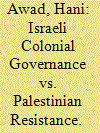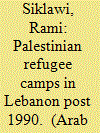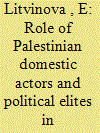|
|
|
Sort Order |
|
|
|
Items / Page
|
|
|
|
|
|
|
| Srl | Item |
| 1 |
ID:
192248


|
|
|
|
|
| Summary/Abstract |
This article examines the institutional genealogy of Israeli colonial governance (ICG) and the accompanying patterns of Palestinian resistance in the occupied West Bank and Gaza Strip. It argues that ICG has experienced three phases, each marked by a particular form of direct or indirect colonial rule. Each of these colonial rule forms has been resisted through a distinct pattern of centralized or decentralized collective political agency. I argue that both the form and governing logic of ICG are determined not only by colonialist aims, but also by their interplay with the Palestinian resistance.
|
|
|
|
|
|
|
|
|
|
|
|
|
|
|
|
| 2 |
ID:
178338


|
|
|
|
|
| Summary/Abstract |
This essay examines JPS’s fifty-year archive of law-related content from the prism of its contribution to the author’s own thinking (and writing) about the relationship between law and politics in the context of the Palestinian question. Noura Erakat identifies as a “greatest hit” Hanna Dib Nakkara’s “Israeli Land Seizure under Various Defense and Emergency Regulations” (1985) for its meticulous documentation of the Israeli legal regime established to confiscate Palestinian lands. Erakat’s “hidden gem” is “Juridical Characteristics of Palestinian Resistance: An Appraisal in Law,” coauthored by W. T. Jr. and S. V. Mallison. Published in 1973, the article argues for the treatment of captured fedayeen as prisoners of war four years prior to the amendment of the Geneva Convention recognizing national liberation struggles as international conflicts.
|
|
|
|
|
|
|
|
|
|
|
|
|
|
|
|
| 3 |
ID:
164744


|
|
|
|
|
| Summary/Abstract |
This article addresses the issue of the Palestinian refugees in Lebanon, their camps, their resistance, and the challenges they have been facing “as refugees” to survive in the deeply divided state of Lebanon and to return to Palestine. Currently there are about 450,000 Palestinian refugees scattered among 12 official and recognized Palestinian refugee camps in Lebanon as well as many refugee gatherings; this number is part of the 6 million Palestinian refugees who are scattered in the world as a result of the establishment of the Zionist entity in 1948. However, on December 11, 1948, the United Nations General Assembly issued the UN resolution 194, during its third session, which stipulated that Palestinians have the right of return to their homes in Palestine. The Palestinian right of return is a Right and therefore it is not negotiable and cannot be compromised under any condition and/or circumstance. There have been continual attempts and proposals to terminate this Palestinian right of return to historic Palestine. To stop these toxic proposals from reaching their goals and to achieve their strategic goal, the Palestinian resistance has the legitimate right to use any means necessary, including armed struggle against the occupiers. The Palestinians in Lebanon are part of this process and they have been struggling on all levels to achieve their civil and human rights in order to improve their social and economic conditions in their refugee camps. Furthermore, the Palestinians have the legitimate right to continue their national struggle against Israel, which is the only way for the Palestinians to achieve their national goal for total liberation. However, there have been additional challenges affecting the Palestinians and their refugee camps in Lebanon post 1990; by the end of the Lebanese Civil War, the Palestinian refugee camps witnessed the emergence and growth of takfiri groups. Consequently, the Palestinian refugees have been sandwiched between oppressive Lebanese rules and the rise of the takfiris inside the camps. The article attempts to answer the following questions: What are the challenges affecting the Palestinian refugees in Lebanon? How can the Palestinians protect their identity from erasure and achieve their right of return to Palestine? Which internal and external groups currently control the camps? In what ways has takfiri ideology impacted the Palestinian identity? How can the Palestinian refugees and their camps survive under such conditions?
|
|
|
|
|
|
|
|
|
|
|
|
|
|
|
|
| 4 |
ID:
128064


|
|
|
|
|
| Publication |
2013.
|
| Summary/Abstract |
This essay on Ghassan Kanafani-militant, political writer and essayist, literary innovator, and preeminent Palestinian novelist-is another in what JPS hopes will become an ongoing, if occasional, series foregrounding individuals (some known, others unknown to the outside world or forgotten) who embody some dimension of the Palestinian Resistance in the early years of its existence. Several such pieces have appeared in recent issues of JPS, notably "Two Portraits in Resistance," commemorating two remarkable figures who left other lives to serve the movement, published in JPS 164, and the landmark 1996 interview with Palestinian poet Mahmoud Darwish, published in JPS 165.
Though less of a household name than the slightly younger Darwish, Kanafani, assassinated in 1972 at age thirty-six by a Mossad bomb planted in his automobile, was known during his lifetime in almost equal measure for his political work and writings and for the novels and short stories that today constitute his enduring legacy. In this evocative remembrance of Kanafani written on the fortieth anniversary of his death, Lebanese novelist Elias Khoury treats the two strands, literary and revolutionary, as inextricably intertwined, two sides of the same coin. The piece was originally published in Arabic in JPS's sister publication, Majallat al-Dirasat al-Filastiniyya, no. 92, autumn 2012, and translated for JPS by Maia Tabet.
|
|
|
|
|
|
|
|
|
|
|
|
|
|
|
|
| 5 |
ID:
139731


|
|
|
|
|
| Summary/Abstract |
THE ISSUE OF PALESTINE is unique, and not only because it is part and parcel of the Middle East conflict and attempts to solve it. The study of the experience of the political institutionalization of the Arab Palestinian territories, of the structuring of Palestinian political processes, of the activities and split of the Palestinian National Authority (PNA), and of the record of the international community as the "architect" of modern Palestine makes it possible to evaluate the roles of Palestinian domestic actors and political elites, understand internal and external factors in building new states in the Middle East, and assess the effectiveness of proposed systems of political organization.
|
|
|
|
|
|
|
|
|
|
|
|
|
|
|
|
|
|
|
|
|